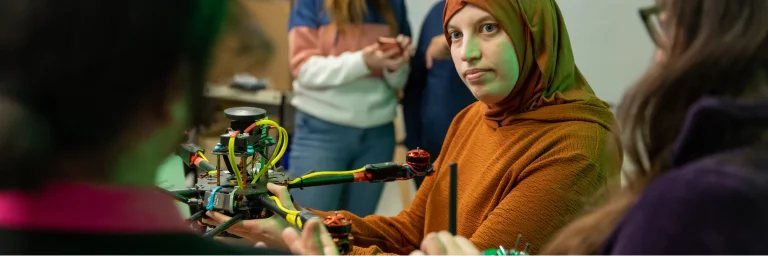Engineering Science Minor
Build the foundations of understanding systems for working with tomorrow's technology.
Whether it's solving problems or creating new technologies, engineering is a foundation of developing our society. With a minor in Engineering Sciences, you'll build an understanding of the processes involved making you a stronger member of any product team.
- Program type:
- Minor
- Format:
- On Campus or Online
- Est. time to complete:
- 2 years
- Credit hours:
- 20
Why minor in Engineering Science?
Technology is always changing, and it plays a greater role in our society. This minor in Engineering Science is designed for students not enrolled in the College of Engineering & Mines, giving you a general introduction to the concepts and applications of engineering. This program is open to any student seeking to learn more about engineering and technology based developments in the future.
What majors pair well with an Engineering Science minor?
Combine an Engineering Science minor with majors outside of the College of Engineering & Mines. Here are some bachelor's degrees that pair well with an Engineering Science minor:
- Mathematics Degree: Pairing engineering science with math offers a strong foundation in theoretical and applied mathematics, which is crucial for advanced engineering analysis, modeling, and optimization. This pairing is valuable for students interested in fields such as computational engineering, numerical analysis, or theoretical research.
- Physics Degree: Combining engineering science with physics provides a deep understanding of fundamental physical principles and their application to engineering problems. This pairing is beneficial for students interested in research, advanced engineering studies, or careers in fields like aerospace engineering, materials science, or robotics.
- Biology Degree: Pairing an Engineering Science minor with a major in Biology provides a foundation in life sciences and engineering principles, preparing students for careers in medical device development, pharmaceuticals, or healthcare technology.
- Chemistry Degree: A major in Chemistry complements an Engineering Science minor by providing a deep understanding of chemical principles and their applications in engineering fields such as materials science, chemical engineering, or nanotechnology.
- Economics Degree: Pairing an Engineering Science minor with a major in Economics offers a unique interdisciplinary perspective, combining technical engineering skills with economic analysis. This combination is beneficial for students interested in fields like energy economics, infrastructure development, or technology policy, where engineering solutions intersect with economic considerations.
Engineering Science Minor Highlights
-
Develop a basic understanding of the engineering design process.
-
Understand the capabilities and limitations of technologies and engineered systems.
-
Be able to make informed decisions about engineering activities and technologies.
-
Learn to work effectively as a member of a team including technology experts.
Jobs in Engineering Science
With technology impacting society and nearly all sectors of the economy, a background in engineering has important, wide-ranging applications in areas such as mechanical, energy and structures.
A minor in Engineering Science from UND adds a foundation for careers in a variety of fields, including:
- Aerospace science and engineering
- Automotive
- Geology
- Health science
- Environmental geoscience
